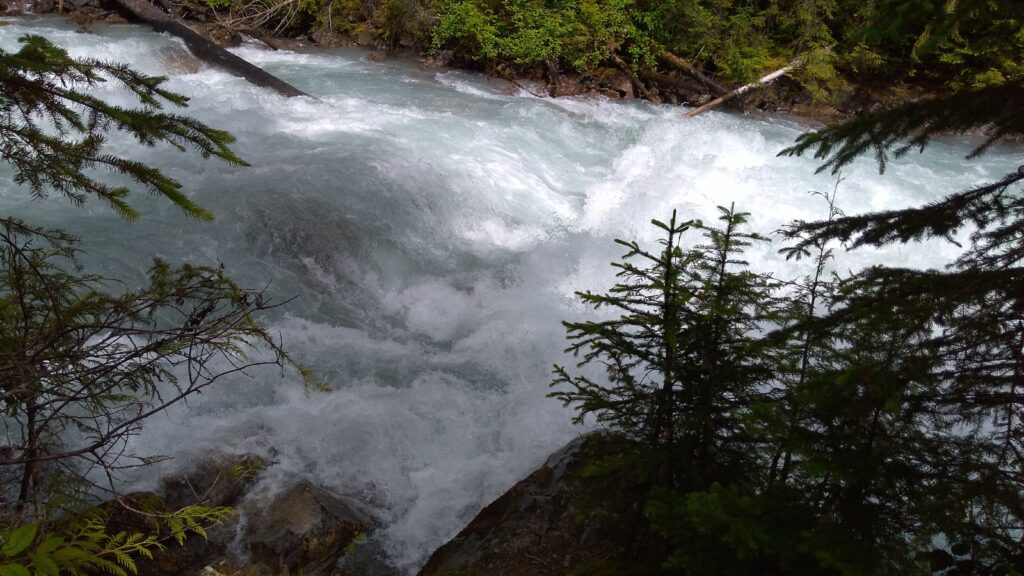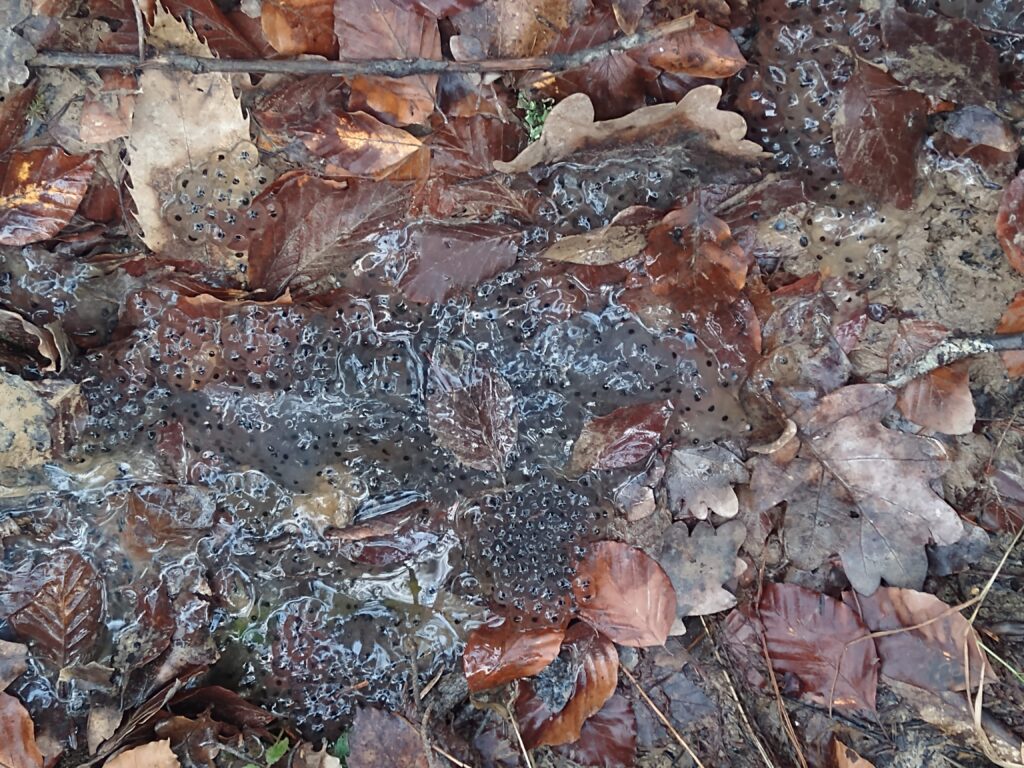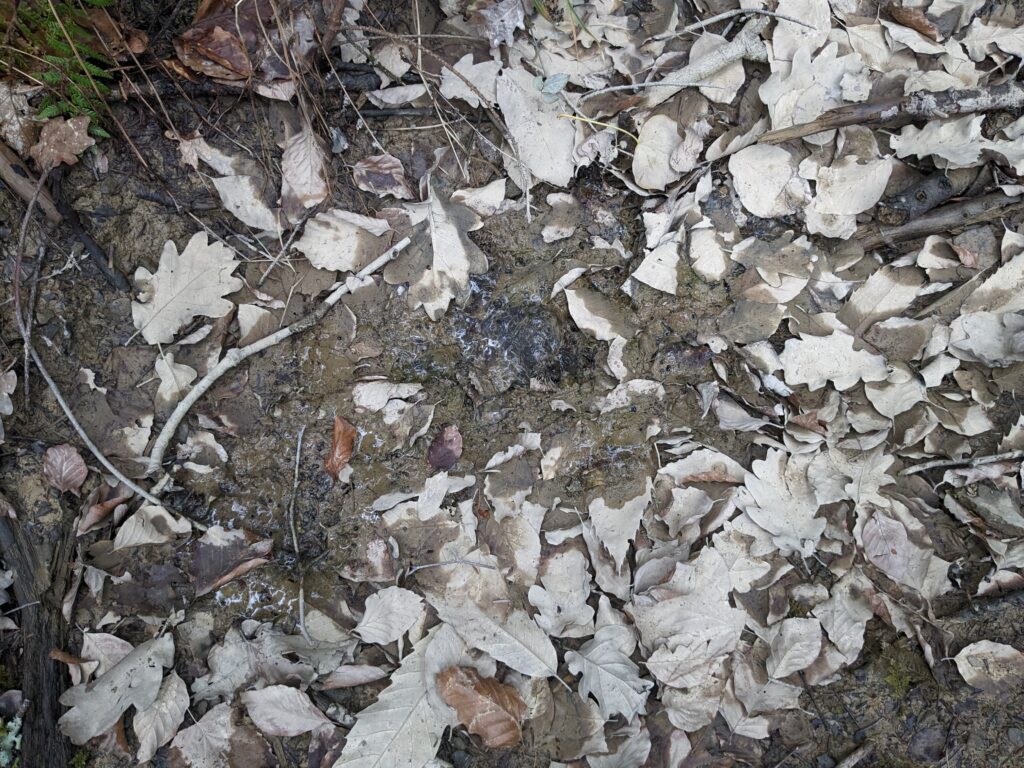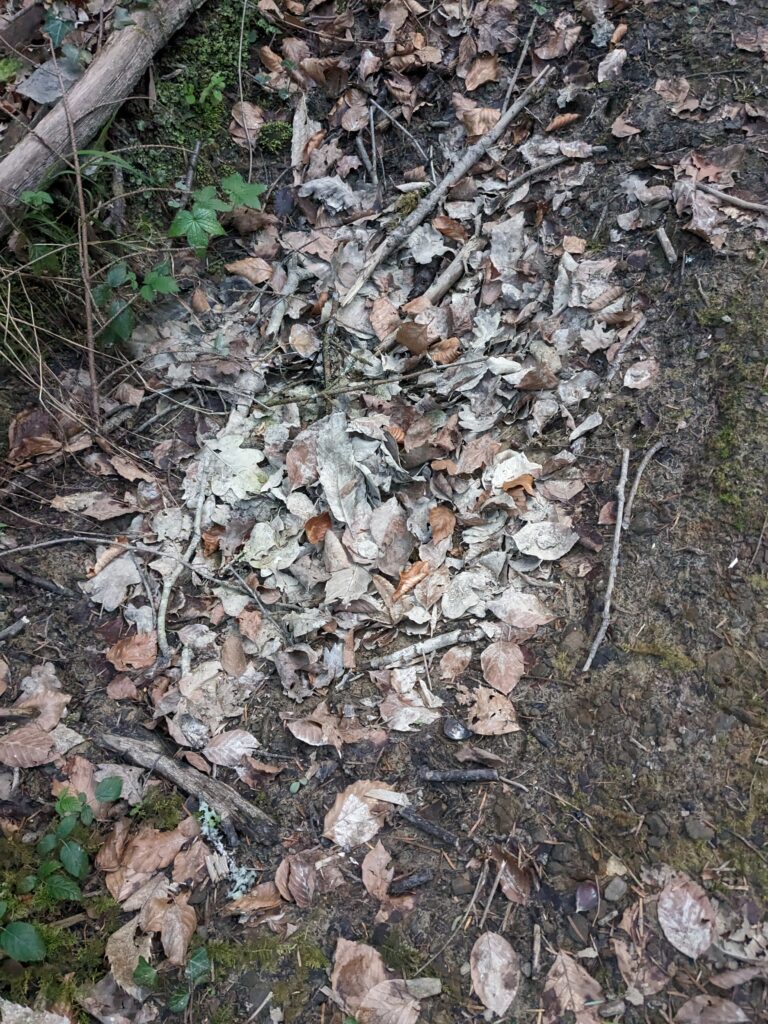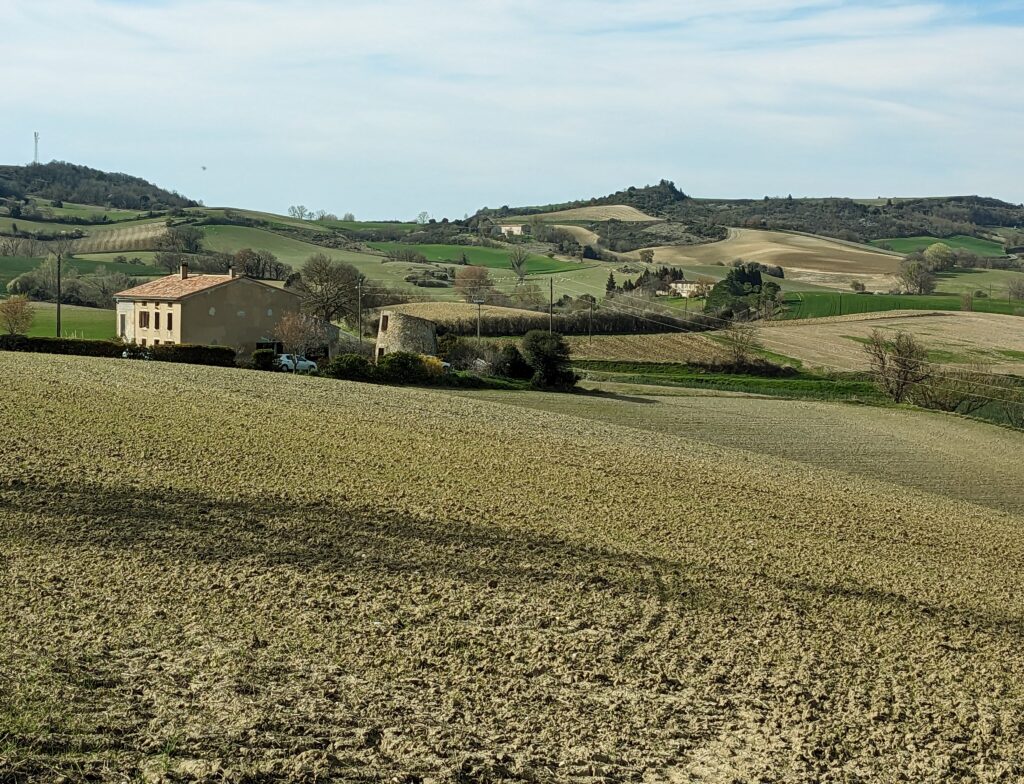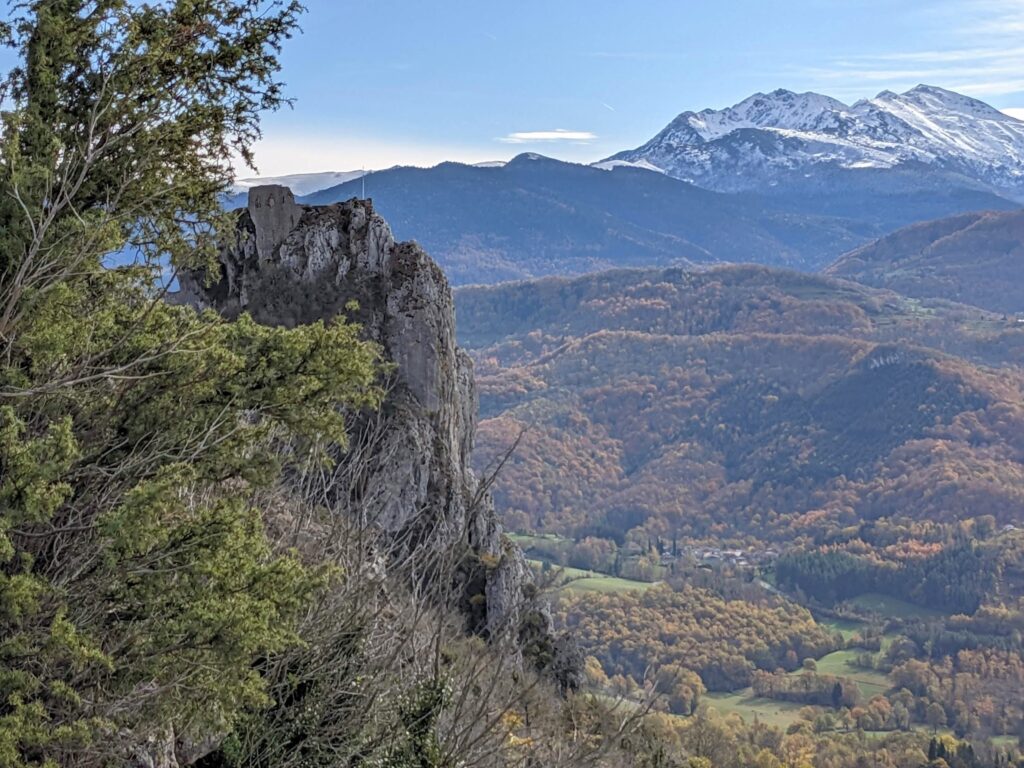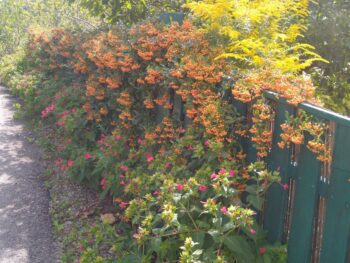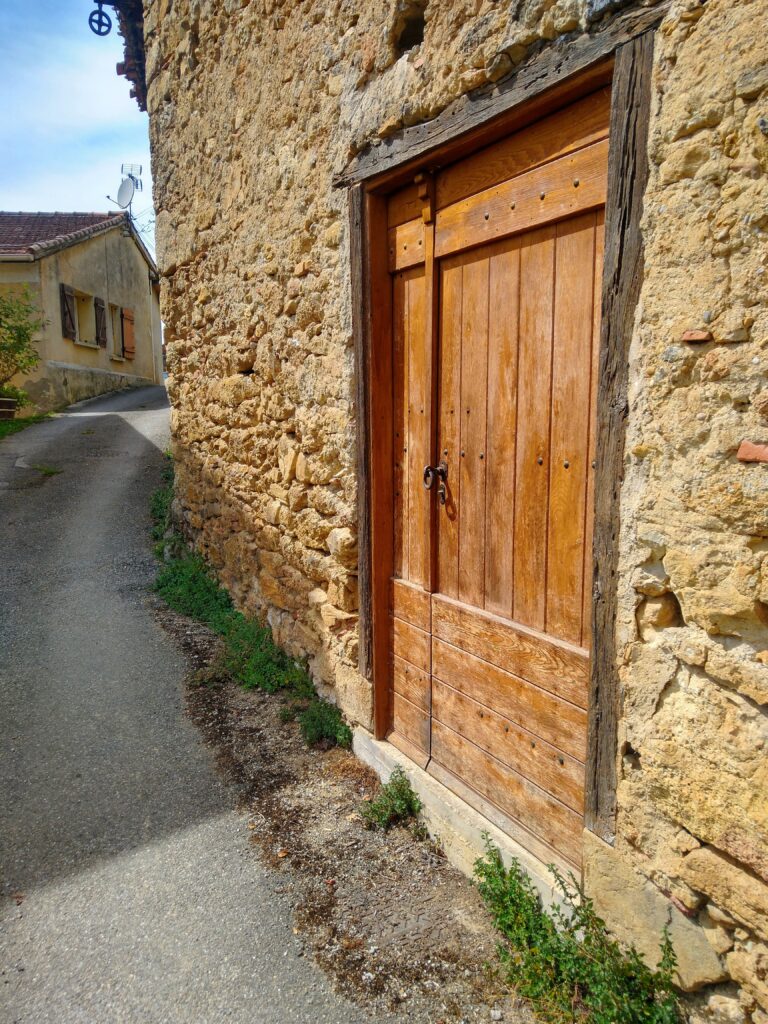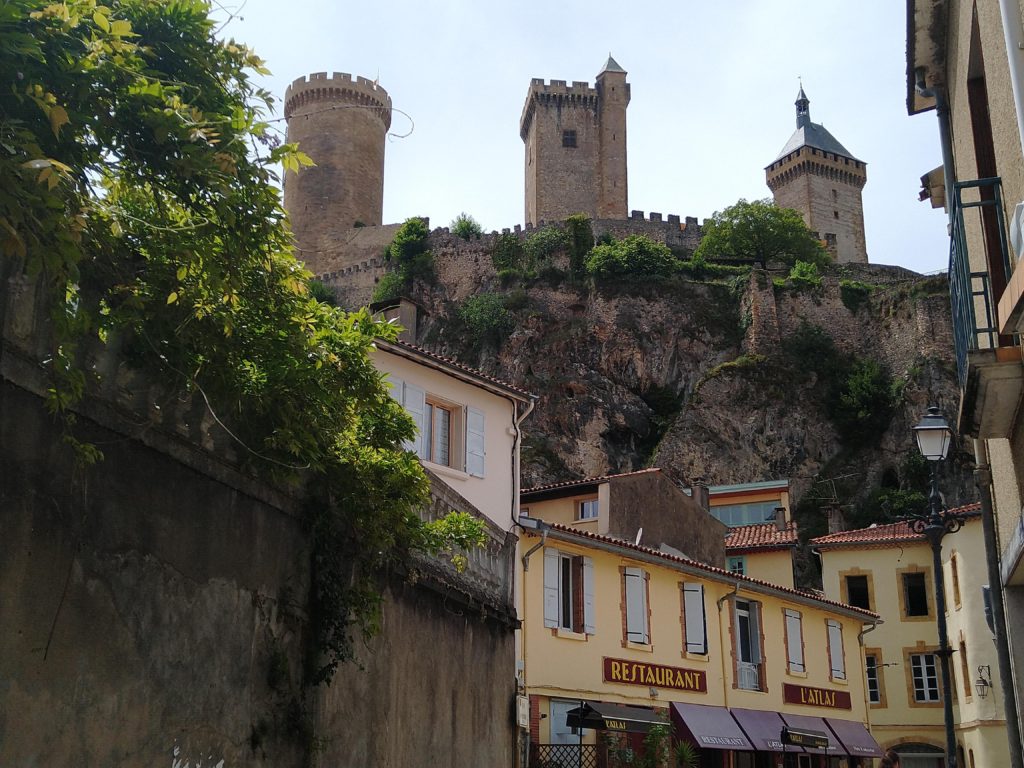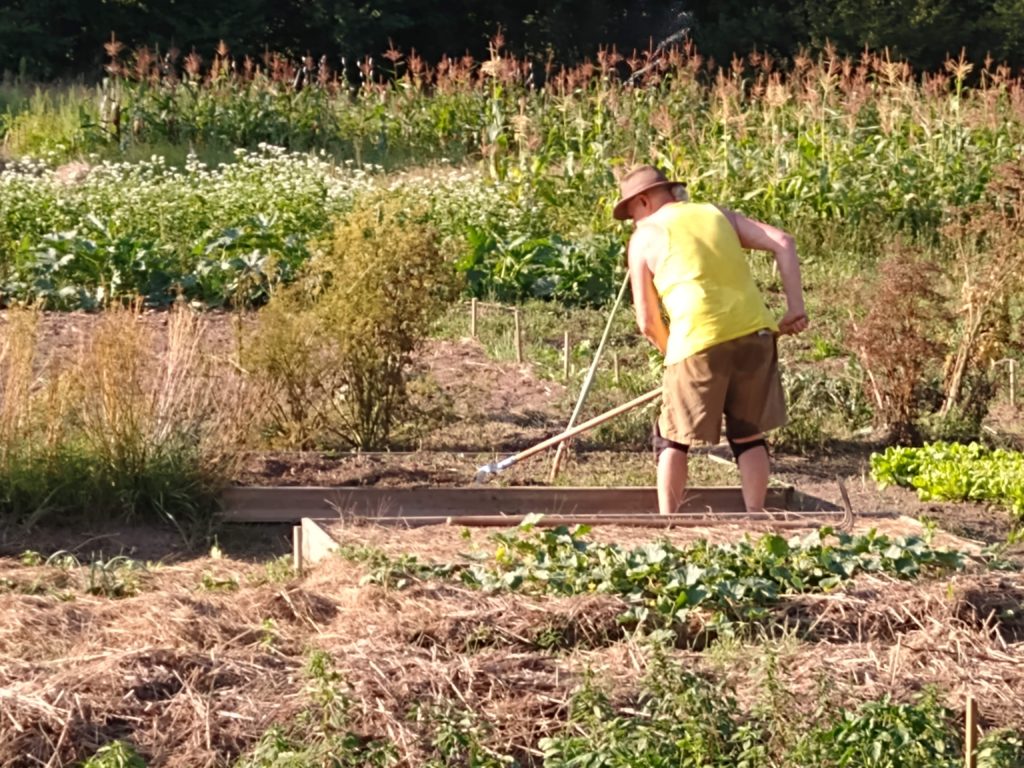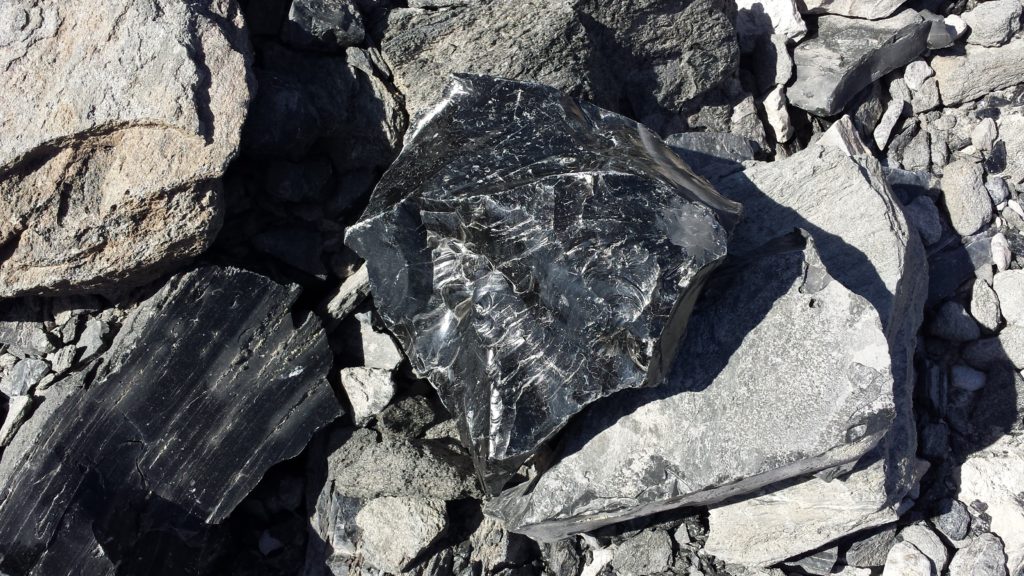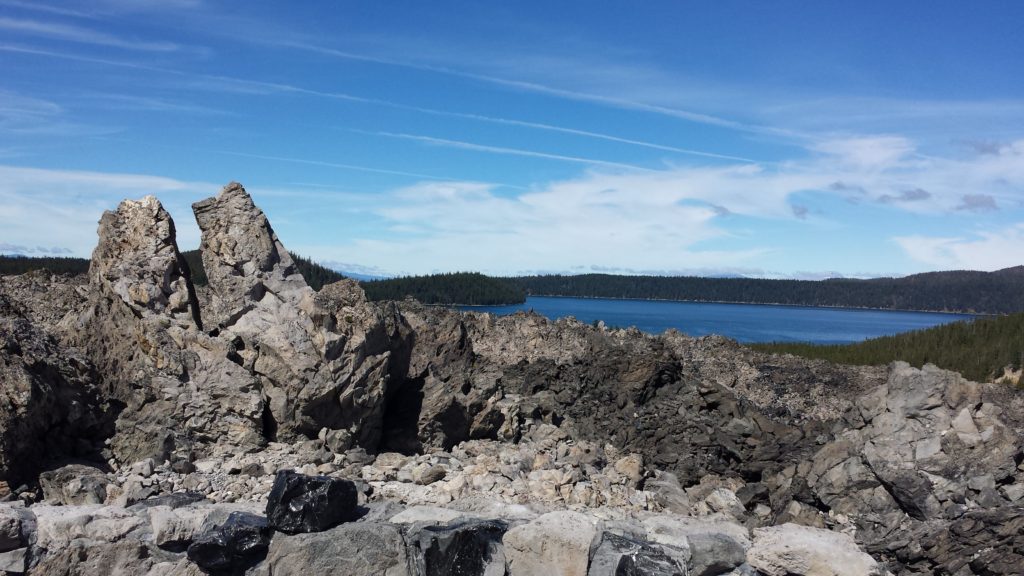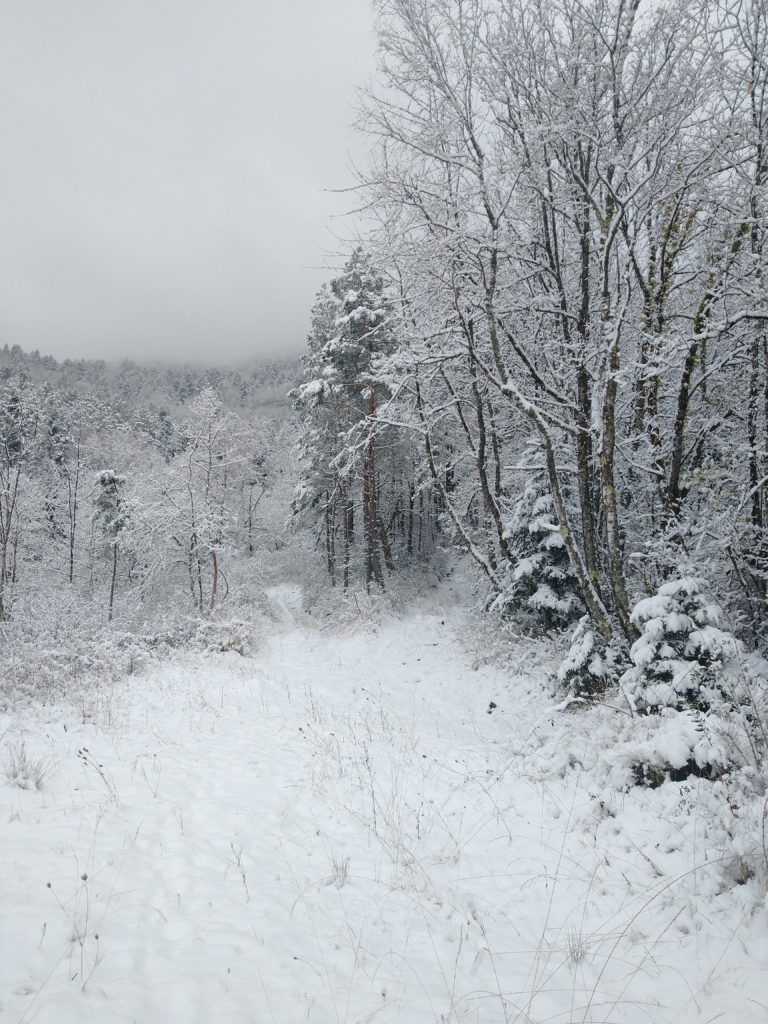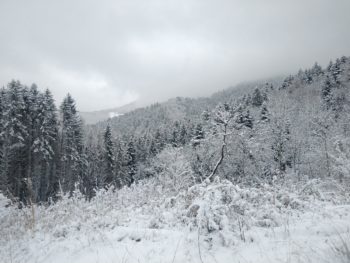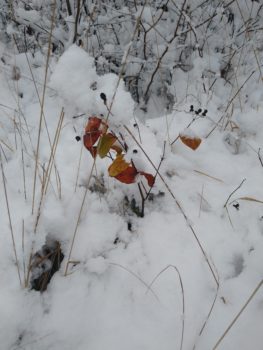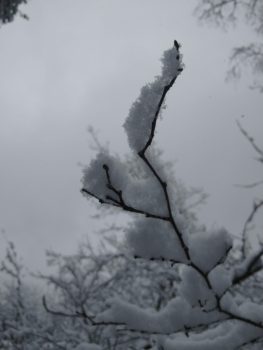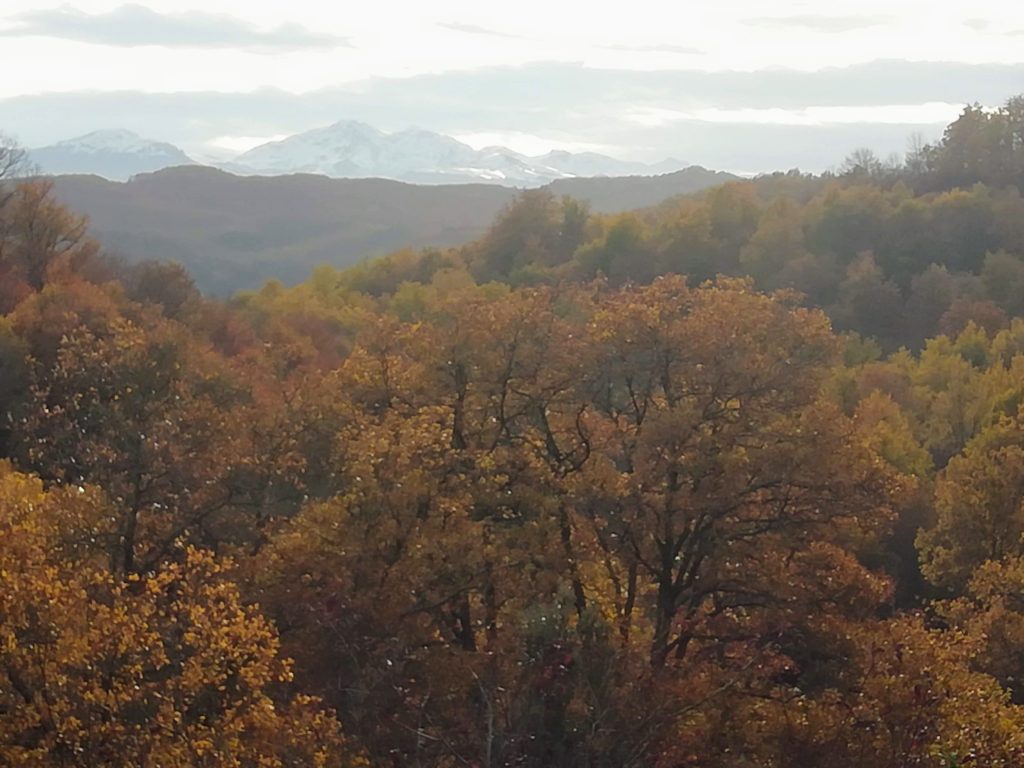
Teddy, the way I remember it, just appeared one day. But maybe that’s not true. There may have been discussions and plans. When I came to visit for the first time he was established there on the land that nestled so beautifully between the breasts of the Vermont hills, so fragrantly colored in autumn, so dusted with white on bare branches in winter, green and soft and flowing in the heat of summer.
He was not in the old sugar shack they had converted into a home, but off at a distance. He had built a tiny log cabin, chinked with moss, roofed with scrounged shingles, where he lived on his own. It was a beautiful little place, everything neatly done with a kind of meticulous care. At first it was very simple, I was told, a single layer of logs,a bed on a shelf on one side, a small old wood stove in another, a small pile of books and some blankets and cushions. Perhaps a stool for the rare visitor. He came for super with the group most days, cooking in his turn, his two long braids dangling over his shoulders, tied together in back to tend to the beans or the soup or to cut into the huge wheel of Vermont cheddar.
It’s hard to remember his face. It seems it was tanned, even in winter. His eyes were dark brown and settled rarely on human faces, preferring the focus of trees, earth and, while cooking, beans and fire and pans. When my eyes did settle on his in the moments together, sitting for a break after cutting trees for our winter wood , they were steady, intent, clear, dark, yet shining gently from the interior. But that was later, when we had a few more precious conversations as we worked together in the woods, I learning he had been, unbelievably, an Eagle Scout and he learning, impressed, that my father had been an editor of Boys’ Life Magazine and had written responses to the “Letters to Pedro”, the mascot donkey of the Boy Scouts. Incongruities.
It’s the way he moved that I remember most. His slim body glided across the paths, his feet silent on the leaves and earth. He was neither tall nor short, but straight, erect still when climbing up the rocks on a trail, the presence of his form always held quietly. He might have been an old man, but he was not. There was patience about his movements.
He spent much of his time in and around his cabin, tending to the world from his position in its center. The rest of his days must have been spent out in the forest, exploring, looking, finding, mostly solitary.
One day when I was sent to find him to see whether he wanted to join a trip to town, he was gathering moss from the circle around his cabin and pushing it into tiny holes in the insulation of the cracks between the logs of its walls with a small stick. He was squatting on the ground as I approached, saying,
“Hi, Teddy.”
He gracefully stood, pushing himself up without effort, and turned to come towards me. Stopping a few feet from me, in seeming respect, he said,
“Hello.”
“I’ve come to see if you want to go on a shopping trip to town.” I said.
“No,” he replied. “I don’t need anything.” He paused for a long moment.
“Would you like to see my cabin?”
“Oh, very much!” I said, feeling greatly honored as a newcomer by this offer. He gestured with a sweep of his arm towards the wooden door.
As I remember, it was late autumn, the brilliance of the leaves mostly gone, some orange and bronzey-brown clinging to the trees lower on the hills where the sun came late in the day. A trail of smoke came through the metal pipe on the cabin’s roof. I ducked a bit to go through the door and entered into an enchanted room that seemed somehow larger than the tiny cabin could contain.
The small wood stove to the left of the door filled the space with heat. A bed on a platform to the right was covered with two woolen blankets, one a dark red. To the left on the other side of the stove was an alcove with a small window looking out towards the hill behind. A round of a very large log was set under the window with a green plastic basin on top. A black cast iron pot and pan hung to one side and a plate, a bowl and a handmade ceramic mug sat on a shelf on the left-hand wall of the room. He showed me how the hook for the round cover on top of the woodstove hung on a convenient hook. He took it down, and inserting it into the small square opening in the cover, lifted the round cast iron piece and set it to the back on the stove top, revealing the glowing logs underneath. He reached behind us for the cast iron pot and put it over the hole.
“This is how I cook.”
“Have a seat.” he said, motioning to the stool. “I’ll make some tea.”
He took a plastic water container from the side of the makeshift log sink and poured a little into the pot.
“That will heat soon.”
He stepped past me and reached to a wooden shelf carved from a split of a log and took down an old book. Opening it, he showed me a page with pictures of several kinds of trees.
“I found this in a shop in town this summer. I’m studying the types of trees.”
He handed it towards me, and I took it from him. “Look through it. The pictures are beautiful.”
He busied himself getting tea leaves from a small metal tobacco tin, a strainer and the mug. I looked through the book, exclaiming to him over one tree or another and asking a question or two about whether or where a tree was found in these woods around us. The water soon boiled and he poured it through the tea strainer into the mug, setting it on the stove. He carefully took down a small basket which hung on a hook by the opening side of the door, away from the heat of the stove, and brought it to me.
“Owl and hawk feathers,” he said. “I find them from time to time up on the hill. Feel them.”
As I gently reached out my hand, he tipped the basket toward me and my fingers touched what felt like the energy of the air, smooth and soft and without weight.
When the tea was brewed, he handed it to me. “None for you?” I said.
“No. It’s for you.”
“Thank you,” I said, sincerely grateful and feeling a bit guilty and suddenly shy.
I took a sip. It was lovely, a bit minty but smoothed by some green, slightly fruity tasting leaf.
“It’s so good. What is it?” I asked.
“Wild mint and verbena I planted in the garden.”
He showed me other small treasures as I sipped my tea. A piece of wood that seemed to have the head of a duck, A large piece of quartz with a rose streak. An owl pellet. A fat, long, oblong seed pod. A big piece of birch bark, so smooth and white with its black markings. “I’m still thinking what to paint on that,” he said. He stood over me and we looked at it together, admiring its markings.
He showed me how on the inside the planks were fitted together. “I have the logs on the outside and left over ends of planks from the yard in town on the inside. Between the two are pine needles for insulation. There are no air leaks. I have to open the door every once in awhile, even in the cold, just to let in some air.”
“And, oh,” he said, as if an afterthought, “I almost forgot this. I just finished it.”
Animated in a way I hadn’t seen before, his eyes smiling, he showed me that in the corner behind the wood stove, a kind of small metal wash tub hung on a nail. Above it, hanging from the ceiling, was a large tin can with holes punched in the bottom. Around it on the wooden planked ceiling was painted a blue sky with a fluffy white cloud in the middle just above the suspended can. He demonstrated how the cloud hid a hole, plugged with a piece of wood, painted to match the cloud and large enough for the end of a small hose. He went to the door, opened it and motioned me to come outside.
He pointed to the roof near the stove pipe.
“See. I have a five gallon container of water that I can put up on top. Then I run a hose with a valve down through the hole and into the can. When I’m ready, I put down the basin, get undressed, stand in it, and open the valve. A shower. The water’s cold, but I’m warm.”
Going back inside, that warmth embraced us.
“It seems like a perfect little home,” I said, as I picked up the mug to finish the last of my tea.
At the compliment, he looked away slightly, out the small window at the back.
“Yes. I like it, too,” he said, with nothing but an internal smile, now settled and still once more behind his eyes.
Having finished my tea, I handed him the empty mug, and, putting on my coat, said “I guess I’d better get going. We’ll be leaving for town soon.”
He pushed open the door and waited, standing aside, for me to step outside before following me and closing the door behind him. As I turned to say goodbye, I saw the face of a racoon appear briefly in the bushes at the edge of the small cleared area. It quickly turned and vanished.
Teddy had seen it too. “That’s Ralph,” he said. “He’s a friend.”
“I thought racoons were untamable. I’ve heard they can be dangerous,” I said.
“Oh, yes,” said Teddy. “He’s not tame. He just comes to live near me about this time of year. This is the third year. He hangs out and eats with me. Last year he climbed down from the roof onto my shoulder. Now he’ll sit on my shoulder sometimes and come with me into the woods. He won’t let anyone else come near him. “
“That’s amazing!” I said.
“Yes, but it’s a big responsibility. I have to make sure he doesn’t get into things in the outdoor kitchen. He’s learned to open jars. Their paws are almost hands. And I have to make sure I have enough for us both to eat.”
He paused for a moment, looking out into the trees.
“He came to me so I’m responsible for him. But it’s not just him.” He looked all around us.
Indicating a broad circle around us with his outstretched hand, he said, “I’m responsible for everything in my universe, the cabin, the trees, the rocks, the plants, the animals, the humans, the insects, everything. I care for them constantly.”
He looked away as if the act of speaking this had been a serious decision, a risk.
He followed deferentially behind me down the path towards the main house in the big old sugar shack, where several people bunked together. Just before the garden, put to bed for the winter, he stopped.
“Thanks for showing me your cabin. See you later,” I said, and walked on.
A few steps later, I turned to see him still standing there, contained, straight yet at ease; solitary, in his way. He waved. I waved back, reflecting his respect–for me, as part of his universe with the plants, the earth, the animals, the bark of the trees; for him, as part of mine, still living inside me now along with the paths through the forest, the walks with friends down the road in the snow, and the unbelievable illumination of the blazing colors of the trees for those brief days in the autumns of Vermont. It is living alongside the sight of the dark, furry pine trees that I see through my window in this moment of my life, an accompaniment to the browns and greys of the bare branched trees, vibrating always upward.
